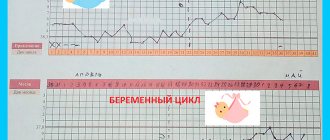Temperature 37 during pregnancy
Temperature during pregnancy
Women carrying a child may sometimes develop a fever, even if it is slight; this always alarms the woman. An increase in temperature is usually associated with illness and the expectant mother begins to worry about this. However, it is quite possible that a temperature of 37 degrees is normal for a woman at the beginning of her pregnancy. In this article you will read about elevated temperature in a pregnant woman.
Possible factors for increasing temperature
There are a number of factors that provoke an increase in temperature. A pregnant woman should be aware that her hormonal levels change during pregnancy and her body temperature may be slightly elevated. If the temperature is 37 during pregnancy, then this is not a reason for concern. A slight increase in temperature is normal for an expectant mother.
Pregnant women often experience an increase in the level of a hormone such as progesterone, which can cause a rise in temperature. It is also undesirable for pregnant mothers to stay in the sun for a long time. Overheating causes an increase in body temperature. Experts say that you need to breathe fresh air more often, as oxygen has a beneficial effect on the well-being of a pregnant woman.
The expectant mother should not worry too much; she should clearly know in which cases she should consult a doctor. If her body temperature becomes higher, close to 38 degrees, then she urgently needs to go to the clinic. After all, it is possible that there is an infection in the body. You must understand that any illness affects the child. Therefore, for the safety of your baby, undergo the necessary examination.
When a pregnant woman's body temperature reaches a higher level, close to 38 degrees, this can be a bad sign. At a later date
Source
How to increase the temperature?
In situations where the doctor excludes the presence of any disease or disturbance in the functioning of internal organs at low body temperature, no special treatment is required.
A woman carrying a child must adhere to certain recommendations:
- eat regularly and balanced;
- provide yourself with adequate sleep and timely rest;
- try to maintain a positive mood;
- take prenatal vitamins.
The appearance of low body temperature during pregnancy can be both a pathological and physiological sign.
If the expectant mother feels well, and all laboratory and diagnostic indicators are normal, then there is no reason to worry. But if a pregnant woman feels weakness or pain, this is a reason to consult a doctor to find out the reasons for the development of this condition.
A timely visit to the doctor will prevent negative consequences for both mother and child.
Author: Violeta Kudryavtseva, doctor, especially for Mama66.ru
Body temperature 37-37.5 - what to do about it?
Temperature: what can it be?
It should be borne in mind that body temperature is a variable value. Fluctuations during the day in different directions are acceptable, which is quite normal. any symptoms
. But the person who first discovered a constant temperature of 37
1.
In the armpit.
Despite the fact that this is the most popular and simplest measurement method, it is the least informative. The results obtained can be influenced by humidity, room temperature and many other factors. Sometimes there is a reflex increase in temperature during measurement. This may be due to anxiety, for example, from a doctor's visit. When thermometry is performed in the oral cavity or rectum, such errors cannot occur.
It is not recommended to measure oral or rectal temperature with a mercury thermometer; you should use an electronic device for this. For thermometry in infants, there are also electronic dummy thermometers.
Temperature 37
From and above there may always be a faulty thermometer. This is especially true for electronic devices, which quite often produce measurement errors. Therefore, when you receive high readings, determine the temperature of another family member - in case it will also be too high. And it’s even better to always have a working mercury thermometer in the house for this case. When an electronic thermometer is still indispensable (for example, to determine the temperature of a small child), immediately after purchasing the device, take measurements with a mercury thermometer and an electronic one (for any healthy family member). This will make it possible to compare the results and determine the error in thermometry. When conducting such a test, it is better to use thermometers of different designs; you should not take the same ones.
Source
What are normal body temperatures for pregnant women?
In general, normal temperature changes include values within the range of 36-37.4°C. It is important to take into account that in the evening body temperature is often much higher than in the morning. Fluctuations in numerical indicators may also be influenced by the time of year. In the summer, women often suffer from a lack of oxygen and stuffiness, which cannot but affect her overall condition. Taking a hot shower or drinking hot coffee or tea can also cause blood pressure surges.
For early stages of pregnancy, temperature readings in the range of 37.1-37.4 ° C are considered commonplace. Increased subfebrile values in the first trimester are associated with serious changes in the body of the expectant mother. As for the second trimester, not everything is so simple here either. For most women, the temperature returns to its previous values as pregnancy progresses, and some young mothers may observe temperature fluctuations, which, however, should not frighten them.
Reference! A woman’s body temperature depends to a large extent on the physiological characteristics of pregnancy. Minor temperature changes can be caused by a variety of reasons and are not considered pathological conditions.
The most common factor influencing fluctuations in thermometric data is the active production of testosterone, which is responsible for thermoregulation. The temperature may also rise due to weakened immunity in a woman. In this case, she experiences immunosuppression, during which the fetus protects itself from possible rejection.
The true cause of temperature fluctuations and the significance of the deviations can only be determined by an obstetrician-gynecologist. However, the expectant mother should know that multiple increases in temperature to 37.5°C and above may indicate a serious abnormality. In this case, the doctor distinguishes 4 degrees of hyperthermia, where the first degree at 38°C is the least dangerous, and the fourth at 40°C indicates the need for urgent hospitalization of the patient.
Temperature 37 during pregnancy
During pregnancy, a number of changes occur in a woman's body. Many women have noticed that the temperature during pregnancy is usually 37 degrees. It is typical especially in the very early stages of pregnancy. Women, not yet knowing about their pregnancy, discovering such a temperature, think that they are sick. However, an elevated temperature while carrying a baby is not always a cause for concern. Today we’ll talk about what temperature is normal for a pregnant woman. And is there any cause for concern if the temperature has risen?
What are the causes of fever during pregnancy?
While carrying a baby, it is absolutely normal for the expectant mother to have an increase in body temperature. This is considered normal and not something to worry about. This is due to the fact that a number of hormonal changes occur in a woman’s body; against this background, the body slows down the body’s heat transfer, so the temperature rises slightly. In the first weeks of pregnancy, a body temperature of 37 - 37.1 is considered absolutely normal, if there are no other symptoms of the disease. Also, during pregnancy, the female body produces a large amount of progesterone. It is the most important hormone during pregnancy; it also increases body temperature. If a pregnant girl stays in the sun for a long time, this can also cause an increase in body temperature. This may also be due to the fact that there is little fresh air in the room in which the pregnant woman spends time. The reaction to all of the above factors is natural and normal.
If, when measured, your temperature is above 37.5 degrees, you should pay attention to this. This may indicate that there may be some kind of infection in the body. Even the slightest infection can have a very negative impact on the development of the fetus. The first two weeks of pregnancy
Source
If the temperature is caused by a cold
During pregnancy, the body is often weakened, so it is not strange that you can easily catch a cold even at 38 weeks of pregnancy. If your body temperature has risen and you feel the symptoms of a cold, then you should take care of your health in order to be healthy by the date of birth, otherwise you may end up in the observation department, where you can meet not only colds, but also pregnant women with other more dangerous diseases.
In order to return to normal, you need to take plenty of warm drinks: tea with honey, milk, infusions of chamomile, lemon balm, sage, etc. You can bring down the temperature by wiping with cool water or a cold compress on the forehead. You should not take drugs that quickly improve the general condition of the body (such as Coldrex, Fervex or Upsarin-Upsa). As a last resort, you can take Paracetamol. Also, you should not take a steam bath, apply mustard plasters, or go to a bathhouse or sauna.
If your throat hurts, it is better to gargle with chamomile or sage infusion than with a salt solution - all mucous membranes during pregnancy are very tender and sensitive and salt can lead to irritation. When purchasing lozenges for sore throats, you need to make sure that they are approved for use in pregnant women.
At this stage, colds or viral diseases are no longer as dangerous as in the first trimesters, but you still need to take care of yourself and, if necessary, consult your gynecologist.
Temperature at 38 weeks is most often a sign of impending labor and is much less likely to be a symptom of some disease. Naturally, it is better for a woman at such a late stage of pregnancy to always be in touch with the doctor leading the pregnancy. Or at least, do not hesitate to contact either the antenatal clinic or specialists at the maternity hospital for any disturbing reason.
Comments: 0
Author: Yulia Ivanovna in the section Pregnant health - all about illnesses and diseases
38 weeks pregnant
Temperature during pregnancy, how to bring it down and normal temperature
The first weeks of pregnancy usually pass in joyful anticipation of a miracle. The expectant mother sensitively monitors changes in her well-being, especially if the pregnancy is long-awaited. And one of the reasons for concern is the change in body temperature. Any deviation from the cherished mark of 36.6 °C is immediately regarded as a sign of illness and a reason to immediately run to the doctor. But this is not always true. So, what temperature is considered normal during pregnancy? A slightly elevated temperature in the early stages of pregnancy is considered normal, as it has understandable physiological reasons. Under the influence of changes in hormonal levels and an increase in progesterone levels, the temperature rises to 37.0 - 37.1 ° C and can remain at these levels for quite a long time. Also, an increase in the body temperature of the expectant mother in some cases is a consequence of simple overheating - just walk around the city for a couple of hours in the sun or carelessly go to the beach, and by the evening the thermometer can even jump to 38 degrees. But this temperature quickly subsides and is not accompanied by symptoms characteristic of inflammation.
Pregnancy and basal temperature
Many women acquire the habit of measuring their temperature daily even before pregnancy. At this stage, it is necessary to determine ovulation and calculate the most favorable time for conception. Further regular measurements make it possible to pre-diagnose whether pregnancy has occurred or not. Basal temperature during pregnancy remains the same as during ovulation - 37 - 37.4 ° C, in some women it can reach 38 ° C. There is no need to worry, this is normal. If conception does not occur, then 12-15 days after ovulation the indicators drop to 36.6 - 36.7 °C. But this method does not provide 100% confidence in pregnancy; additional research is needed for an accurate diagnosis.
In the early stages, a temperature of up to 37.3 °C is considered normal. Basal temperature during pregnancy ranges from 37 to 38 °C.
When fever during pregnancy is a symptom of illness
During pregnancy, a temperature of 37 and even up to 37.5 is considered normal in the early stages. This is provided that there are no other symptoms indicating the disease. However, during the nine months of waiting, anything can happen - from a simple cold to a serious infection, and then an increase in body temperature will become a signal of an onset of illness.
In the first trimester, the cause of high temperature, above 37.5 - 38.5 ° C, is acute respiratory infections, influenza and sore throats. This is explained by a slight decrease in a woman’s immunity during pregnancy - nature took care of the baby and provided mechanisms for suppressing the activity of the mother’s immune system, so as not to cause premature rejection of the “foreign” body from the mother’s body. But all kinds of viruses and bacteria happily take advantage of these “good intentions” of nature, and very actively begin to attack the “weak points” of the expectant mother. More often it is the nasopharynx, and that is why sore throat or ARVI so often plague women in an interesting position.
But not only acute respiratory infections can cause high fever. So, at a period of 3-5 weeks, a temperature of 37.5 - 37.8, accompanied by intense pain and bleeding, may be a symptom of an ectopic pregnancy or miscarriage.
High temperature during pregnancy (especially the second and third trimester) is not only due to a cold. Almost all acute inflammatory diseases - pyelonephritis, cystitis, gastroenteritis, pneumonia, herpetic infection and many others, are accompanied by severe hyperthermia - over 38.5 ° C.
Low-grade fever (37.3 – 38.0) can be a sign of exacerbation of a chronic inflammatory process, as well as a symptom of such serious diseases as cytomegalovirus or tuberculosis. Therefore, any increase in temperature is a sufficient reason to visit a doctor, in some cases it is better to do this immediately.
How to reduce fever during pregnancy
In the first trimester, slight changes in temperature are normal and do not require treatment.
In case of colds and infectious diseases, an increase in temperature is an immune response with which the body resists the aggressor. Therefore, if the mercury column on the thermometer has not crossed the 38 ° C mark, then there is no need to reduce this temperature.
The main recommendation for such a case is bed rest and plenty of warm drinks. This will help detoxify your body faster and get rid of fever.
During pregnancy, a temperature rise above 38 degrees before 12 weeks and after 30 weeks is considered dangerous. In the early stages this is dangerous for the fetus, in the later stages it is fraught with premature detachment of the placenta.
If during pregnancy the temperature is 38 and high - above 39, rises quickly, is accompanied by dizziness, nausea, impaired consciousness and other symptoms of severe intoxication, then you can take a drug with paracetamol - Panadol, Efferalgan, Cefekon-D.
Physical cooling methods give good results - cold on the head, on the main vessels (below the knees, on the wrists and in the elbows); wiping with cool water or a weak vinegar solution.
If, at a high temperature, the palms and feet remain icy, the woman experiences severe chills, then it is necessary to give a hot drink and warm her up - this will quickly remove the spasm of peripheral vessels, increased heat transfer will begin, and the temperature will drop.
If you cannot bring down your temperature within 24 hours, or it continues to rise, consult a doctor !
This is interesting:
Why might your temperature rise at 38 weeks?
Some books or websites dedicated to pregnancy and childbirth indicate an increase in temperature in the later weeks of pregnancy, including at 38 weeks, as a sign of imminent labor. But, most likely, these are only particular characteristics of a woman’s body. After all, the birth process is very complex, all organs and systems of a woman are involved in it, and therefore they all strive to ensure that the birth goes well. Perhaps it is in this way - by raising the temperature, vomiting and diarrhea - that the body prepares for childbirth, cleansing itself of everything unnecessary.
In fact, an increase in body temperature is a sign of a problem in the body, some kind of inflammatory process. But there is no need to panic when the temperature rises. Perhaps this particular case shows that an increase in temperature at 38 weeks of pregnancy is a sign of impending labor.
How you feel
At 38 weeks pregnant, you want to give birth as quickly as possible. The weight, clumsiness and constant ailments are very tiring, and I can’t wait to hold my baby in my arms as quickly as possible.
Before birth, the abdomen must drop down: the fetal head is placed in the pelvic cavity, and the baby assumes its final position. Now the uterus does not interfere with the movement of the diaphragm and does not put so much pressure on the internal organs, so it is easier for you to breathe, and heartburn only bothers you if there are errors in your diet. However, due to the downward displacement of the baby's head, the load on the pelvic bones increases. Therefore, you may experience pain in this area, in the sacrum and in the back of the leg. And pressure on the bladder causes frequent urge to urinate.
By the 37th – 38th week of pregnancy, the mammary glands enlarge even more. A network of small veins shines through the skin, the areolas darken even more noticeably, and “nodules” of the sebaceous glands are clearly visible on them. During this period, the nipples become very sensitive, and if you touch them, the muscles of the uterus contract. It's time to prepare your breasts for feeding your baby. Gently massage your nipples with a rough towel to prevent cracks from forming on them in the future.
Signs of impending labor at 38 weeks
If an increase in temperature really turns out to be a sign of imminent labor, then in addition to this symptom the woman will definitely experience others.
Very often, expectant mothers at this stage experience false contractions, which prepare the body for real ones, they are quite easy to distinguish from each other - when the contraction begins, you just need to get up and walk around, if the pain goes away soon, then the contractions are false.
how to find out that there is a multiple pregnancy? Surely only a doctor will tell you about this after an ultrasound examination, and not the first, but already in the second trimester of pregnancy.
Therefore, for now you can only guess about double happiness or rely on
So
Source
Necessary studies and tests at 36 weeks of pregnancy
Perhaps the doctor makes an appointment for you every week now. A urine test must still be taken before each visit to the antenatal clinic, because its results can be used to judge the condition of the pregnant woman and exclude possible pathologies. A blood test is prescribed less frequently, but if indicated, you may be prescribed one. Before giving birth, it is important to check whether there are any disturbances in the vaginal flora, so that the baby is not infected with pathogenic microflora when passing through the birth canal. Therefore, the doctor can take a smear for microflora.
At the 36th week of pregnancy, an additional CTG may be performed if before this the results of this study were not very good or the doctor saw signs of deterioration in the condition of the fetus by its heartbeat and activity.
CTG norms at 36 weeks of pregnancy
- 8-10 points - this assessment of the fetal cardiac activity indicates that everything is fine with the baby and there is nothing to worry about.
- 5-7 points – these results indicate incipient fetal hypoxia. It is not fatally dangerous for him, but still requires additional studies (ultrasound, Doppler) and repeated cardiotocography to assess the baby’s condition over time.
- From 4 points and below – the baby’s condition is serious and requires urgent medical attention. Most likely, an emergency delivery will be required to save the baby's life.
Is it normal to have a fever during pregnancy???
Girls, hello! According to the calendar, I am 4 weeks pregnant. The temperature stays at 37.1. Is this normal? or is there something wrong with me? Tomorrow or the day after tomorrow I’m going to register, I’m very afraid. did anyone have a temperature???
I personally haven’t had any NC at all, but they say it’s normal!!! And about accounting... Have you decided too early??? It’s just that, for example, the doctor initially told me that not earlier than 10 weeks... There was nothing to do there before... So I registered on April 30 - 10 weeks and 4 days... In my opinion...
With my first child, I think I got up at 6-7 weeks. They didn’t say anything like that, on the contrary, they sent me for all sorts of tests, recommended vitamins, etc.
Well, you need to take tests for the first time before 14 weeks, I’m going to take them now, an ultrasound as well, and my doctor prescribed vitamins for me even before that, I’ve even taken some!!! She’s just of the opinion that there’s no need to go there again and worry the baby, and there’s no need to get on your nerves in hospitals!!!
Hormones are responsible for almost every change in how you feel. Progesterone, which begins to be produced after ovulation, increases body temperature by 1-2 degrees. And if you become pregnant, progesterone continues to remain at this level in order to maintain the uterus and placenta in a normal state..”
My temperature stubbornly stayed at 37.1 throughout the first trimester. I asked the doctor - this is normal. Yes, you can read a lot of articles on this topic on the Internet. The main thing is that if there are signs of a cold, then do not miss it. Well, if the temperature rises above 37.5, don’t miss it either, because this is no longer normal.
What time is the belly visible during pregnancy? Depending on your body type. In skinny people it starts to be visible earlier. And usually by the 4th month, the uninitiated begin to ask questions. (and I had a friend who was overweight, she gave birth “unexpectedly” to those around her” you don’t need
I’m now also 4 obstetric weeks and my body temperature is also 37.1, but only in the evening for some reason, but I read somewhere that this is very normal!!! Don't worry. I’m also thinking about going to a gynecologist by the end of the week, probably a paid one, it was just spontaneous a year ago
Source
Possible problems
Breech presentation of the fetus at 36 weeks of gestation
Most often, the fetus takes its final position in the uterus by the 34th week of pregnancy. If we talk about the timing of the necessary measures for turning the fetus, then exercises can be done in the period from 29 to 34 weeks, and external turning in a hospital setting (the doctor acts on the fetus from the outside using his hands) - in 32-34 weeks. Even despite this period, the baby still has a chance to roll over if his size allows it. If this still does not happen, doctors will have to assess the degree of risks during childbirth naturally, and if necessary, a caesarean section will be prescribed.
Swelling at 36 weeks of pregnancy
Whether you had swelling before or not, by the end of pregnancy they will definitely appear. Therefore, their appearance and development must be clearly monitored, since this symptom may be a component of a phenomenon such as gestosis, or late toxicosis. To prevent swelling from increasing sharply, control the amount of fluid you drink during the day. A large amount of water in this case is not very good, but it is also not worth greatly reducing the volume of liquid consumed, so as not to cause dehydration. It is also recommended to reduce the amount of salt in the diet, because it contributes to fluid retention in the body.
Your legs are already under a lot of stress, and swelling will contribute to this even more. To ensure that your legs rest and the fluid stagnation in them does not increase, you need to find an opportunity to sit or lie down with your legs elevated during the day. To do this, you can place some kind of pillow under them or rest them on an overlying surface.
Nausea at 36 weeks of pregnancy
This condition can occur when a pregnant woman’s blood pressure increases. If this is not the first time you have felt sick, start monitoring changes in your blood pressure, and also contact your gynecologist. If swelling is added to the above symptoms, and protein is found in the urine, we can talk about the development of preeclampsia. This condition is a strict indication for hospitalization. In a hospital setting, the woman is provided with the necessary assistance, and if necessary, a caesarean section is performed.
Temperature 37 during pregnancy
A new lifestyle, a change in nutrition to a healthier diet and a responsible attitude towards one’s health - all this is a consequence of the emergence of a small life in a woman’s body. Thoughts about the baby and his well-being in the womb sometimes become manic, and even a slight deterioration in one’s own health can cause panic in a pregnant woman.
A common occurrence during pregnancy is a slight increase in body temperature to 37 degrees. The aches in the body that accompany this phenomenon give rise to fear, because if the mother becomes ill, the embryo may also become ill. Today we will try to figure out what to do if the temperature of the expectant mother is elevated, for what reason this happens, and how the child feels when the mother is sick.
This question may seem stupid, because an elevated body temperature in the normal state indicates an inflammatory process or the fight against a virus, which is unacceptable during pregnancy. In fact, the very fact of pregnancy is already the reason for the rise in mercury. This is due to the fact that a pregnant woman experiences rapid changes in the body and a drop in the level of heat transfer. At the same time, the speed of metabolic processes changes, and as a result, the release of energy. In the early stages, a factor such as elevated temperature is not considered a pathology; moreover, it is one of the signs of conception that has occurred. Based on numerous medical studies, experts say that a temperature of 37 is normal in the early stages of pregnancy. But it is still necessary to pay attention to this factor, because a thermometer value of 37 in the second and third trimester may indicate the presence of a viral disease.
In addition, everyone has their own body temperature, and even 36.6 is not normal for every person.
P Source
Temperature during early pregnancy (37-37.5-38)
Temperature during pregnancy in late and early stages: treatment, causes, prevention
The temperature during pregnancy in the early stages may be slightly elevated and this is not a pathology, in most cases. The fact is that various changes in a woman’s body, and especially hormonal ones (production of the hormone progesterone), cause a slowdown in heat transfer and, as a result, an increase in temperature values. If the temperature during pregnancy is 37 exactly in the first weeks after conception, then this should not be embarrassing, unless there are other symptoms of disease. Let's take a closer look at the algorithm of actions for increasing body temperature, the causes and methods of treatment/alleviation of the condition.
Low-grade fever. What to do?
This is a temperature of up to 38 degrees. The values may seem small, but this condition is quite difficult to tolerate. I am haunted by a feeling of fatigue and weakness. But that's not the worst thing. Such a temperature, especially if it persists, may be the first symptom of some sluggish, but perhaps very dangerous inflammatory process. Thus, a temperature during pregnancy of 37.5 can be observed with ectopic localization of the fertilized egg - a very dangerous phenomenon for a woman. You will read about possible reasons further in this article.
What to do? We would recommend, first of all, going to a gynecologist if you are already registered with him. If no gynecological pathologies are identified, then you will most likely be sent to a general practitioner, who will refer you for blood and urine tests. If there really is an inflammatory process, and the temperature persists during pregnancy, treatment will be prescribed after diagnosis.
Causes and consequences
Let's look at the pathological reasons. What diseases can be practically asymptomatic? These are pyelonephritis, tuberculosis, herpes, cytomegalovirus and other diseases that are very dangerous for the fetus.
Much less often , fever during early pregnancy , caused by viral and infectious diseases, is observed in women planning a child - that is, those who, in advance, even before conception, underwent a full examination and, if necessary, a course of treatment.
Any infection can be very dangerous for the fetus. The consequences depend, to a greater extent, on the gestational age. If the disease is severe in the first 1-3 weeks after conception, then most likely a spontaneous miscarriage will occur or the fertilized egg will stop developing. In this case, the principle will apply: “All or nothing.” If the infection affects the fetus during the formation of the main organs and systems (that is, in the first trimester), then this is almost guaranteed to lead to some kind of congenital pathology. In difficult situations, doctors recommend terminating the pregnancy. If not, then such an expectant mother is monitored especially carefully; she must undergo all the necessary screening tests, the results of which will most likely show whether the child is healthy or not.
Infection is less dangerous after 12-14 weeks, when the placenta is fully formed. If fever during pregnancy in the early stages and the reasons that caused it in the first trimester often lead to the death of the fetus, then from the second trimester the baby is protected by the already formed placenta. But don’t think that the placenta will save you from any misfortunes. No. But it will slightly smooth out the negative external influence.
From about the 30th week, a temperature during pregnancy of 38 and even lower again becomes quite dangerous. As a rule, maternal illnesses no longer lead to developmental pathologies at such a time, but high temperatures can provoke premature placental abruption (a very dangerous condition for a woman) or lead to premature birth. And the baby seat itself no longer protects the baby as much, since it (the baby seat) tends to wear out, “grow old,” and with each passing week it performs its protective functions worse and worse at longer gestation periods.
How to lower your temperature
Whatever the reason for the fever, it needs to be eliminated, as we wrote above, this can provoke placental abruption. All methods can be divided into medicinal and non-medicinal. Remember that if the temperature during pregnancy is 37-37.5 , then there is no need to bring it down. In this way, the body fights the pathogen and there is no need to interfere with it (the body).
If the thermometer already shows more than 38-38.5 degrees, then it’s time to start treatment. Of course, the room where you are should not be stuffy. Wear light clothing and remove woolen items. Drink more of any warm liquid, be it tea or compote. You cannot wipe yourself with vinegar and vodka - it is very dangerous. As a last resort, if such measures do not cause discomfort, you can undress and wipe yourself with water at room temperature. You should not put a cool cloth on your forehead when you have a chill, this will provoke even more trembling, which means the temperature will also rise.
A temperature during pregnancy of 38 and above can be brought down with the help of medications, but not all. The safest and most effective is paracetamol. The main thing is to maintain the correct dosage.
Prevention
As you already understood from the article, it is very harmful for expectant mothers to get sick, and therefore it is worth taking preventive measures. The first thing we must do is strengthen our immune system. Proper nutrition with an abundance of fresh vegetables and fruits goes without saying; additional intake of complex vitamins in tablets is not required. It’s very good if you were hardening before pregnancy and can tolerate temperature changes well.
In “dangerous” times, when the likelihood of contracting the flu or acute respiratory infections is very high, it is advisable to eat a small head of garlic every evening - an excellent method of preventing colds. You can also place cut heads of garlic around the room - there will be no unpleasant smell, but this healthy vegetable will release phytoncides into the air - substances that fight pathogenic bacteria. Drinking a decoction of lemon balm is very good for the immune system. This plant is rich in vitamin C - ascorbic acid. In principle, the same ascorbic acid is found in citrus fruits. But they are too allergenic, be careful. Drinking ascorbic acid tablets, especially in combination with glucose, should only be done on the recommendation of a doctor. Another clear indication of a lack of ascorbic acid in the body is the desire to eat something sour. If there is not enough vitamin C, fever during pregnancy requires long-term treatment, the disease may not subside for a long time due to reduced immunity.
The second rule is no less important - spend less time in crowded places. If you have the opportunity to ask your relatives to take you a coupon to see the doctor in the morning at the reception, do it. You understand perfectly well that there are a lot of patients crowding around the reception desk, which, by the way, is unlikely to let you get a ticket without queuing. If possible, visit the antenatal clinic only on pregnancy days. These days are set aside specifically for expectant mothers in order to protect them from respiratory diseases. If you feel that your temperature is rising during pregnancy in the early stages , it is better to rest at home and not go outside, take a day off from work. Regarding clothing, that’s a separate conversation. Overheating is just as harmful and dangerous as freezing. Dress appropriately for the weather.
Afterword
Avoiding fever during early and late pregnancy and common colds is not easy. And most expectant mothers tolerate them calmly and then give birth to healthy children. However, there are statistics on unfavorable cases when, after a mother’s illness, she gave birth to sick children. Therefore, still try not to get sick while pregnant.
Custom search
How not to lower your temperature in the third trimester
Trying to quickly lower the temperature, a woman may make a mistake and take a seemingly harmless drug, but which is actually dangerous during pregnancy. One of these medications is aspirin.
Aspirin for expectant mothers should be strictly prohibited! This medicine is known to thin the blood, which is why it is even used to prevent blood clots. During pregnancy, aspirin can provoke uterine bleeding, which can cause fetal death.
During an illness accompanied by a fever, it is undesirable to heat the room too much. On the contrary, the room should be cool. Classic room temperature 18-20 is quite suitable. An indicator of 20-22 degrees in an apartment is also acceptable, but not higher. Excessive heat in the room only worsens the woman’s condition and slows down recovery.
To get rid of cold symptoms and, in particular, high fever, the expectant mother should not use any thermal procedures. You cannot steam your feet, use mustard plasters, or apply hot compresses.
If there is a need to take antibiotics, this issue should be discussed with your doctor. Perhaps the situation is so critical that only such drugs will help get rid of the infection, but it is unacceptable for a pregnant woman to treat herself with them.
Of course, it is better to avoid contracting colds altogether, especially since the expectant mother’s immunity is not at a high level anyway
In the same case, if the temperature has risen, despite the precautions taken, you need to be treated only with medications prescribed by a specialist, and then the disease will not harm the unborn baby. In most cases, the condition can be normalized without the use of potent drugs, which will preserve the health of the unborn baby and improve the woman’s condition
We also recommend:
— Colds during pregnancy in the third trimester: treatment methods and consequences
— Can pregnant women take aspirin and how to take it correctly?
Gargling during pregnancy
Food poisoning during pregnancy
3rd trimester









